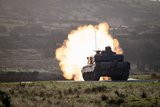Israel, US test ballistic missile interceptor
The Israeli and US defence ministries said Tuesday they had successfully tested ballistic missile interceptors deployed at Israeli airbases.
The tests came a day after the latest deadly exchange of fire between Israel and Iranian forces operating in Syria.
The Arrow 3 interceptor system, designed to shoot down missiles above the atmosphere, was deployed at air force bases across Israel two years ago.
An Israeli defence ministry statement said Tuesday that the system's radars had detected the target, a replica missile launched from central Israel.
‘At the right moment, the Arrow 3 interceptor was launched toward the target and successfully completed its mission,’ it said.
Arrow 3 is intended to serve as Israel's highest-altitude missile interception system.
Systems for intercepting incoming missiles at lower altitudes are either already deployed or close to becoming operational.
In December, Israel's arch-enemy Iran confirmed that it had carried out a missile test, after Western powers sharply criticised a launch of medium-range ballistic missiles.
Western powers said the missiles were capable of carrying nuclear warheads and therefore violated a landmark 2015 nuclear deal with world powers.
Tehran says its missile programme is ‘non-negotiable’.
Israel had opposed the deal between Iran and major powers, which lifted a wide range of international sanctions in exchange for limits on the Islamic republic's nuclear programme.
Iran reined in most of its nuclear programme under the 2015 deal, but has continued to develop its ballistic missile technology.
Israel's Arrow system, partly financed by the United States, was developed and produced by Israeli Aerospace Industries in partnership with Boeing.
‘The success of this test is a major milestone in the operational capabilities of the State of Israel and its ability to defend itself against current and future threats in the region,’ the defence ministry said Tuesday.
The system passed a series of tests before being deployed in 2017, and the ministry did not give further details on the purpose of Tuesday's test.
Israel has vowed to prevent Iran from entrenching itself in neighbouring Syria.
Israeli forces carried out a series of strikes in recent days on what it said were Iranian facilities in its war-torn neighbour, after a rocket was fired on Sunday at the Golan Heights.
A monitor said Tuesday 21 people, mostly Iranian, died in the raids.
Israel accused Iranian forces of firing the surface-to-surface rocket, which was intercepted by the Iron Dome system.
More from Land Warfare
-
![US DoD task force’s DroneHunter acquisition lays groundwork for Replicator 2 CUAS strategy]()
US DoD task force’s DroneHunter acquisition lays groundwork for Replicator 2 CUAS strategy
As the US Department of Defense looks to counter the growing threat of uncrewed aerial systems to improve homeland security, the DroneHunter acquisition could point to future commercial innovation.
-
![Land forces review: Tanks, trucks and IFVs dominate but woes remain for Ajax]()
Land forces review: Tanks, trucks and IFVs dominate but woes remain for Ajax
This year has begun with main battle tanks taking the lead while orders for large logistics and support vehicles continued from last year. Additionally, two of the British Army’s most significant contracted vehicle programmes, Ajax reconnaissance vehicle and Challenger 3 tank, continued to make news in January.
-
![Canada looking to expedite purchase of armoured fighting vehicle and a new tank]()
Canada looking to expedite purchase of armoured fighting vehicle and a new tank
Canada is improving its Leopard main battle tank fleet but before this is fully completed, it is expected to begin looking for new vehicles.
-
![Layered protection: How air defence is adapting to rising drone and missile threats (podcast)]()
Layered protection: How air defence is adapting to rising drone and missile threats (podcast)
A surge in aerial threats – from advanced missiles to low-cost drones – is reshaping the way militaries approach air defence, driving demand for flexible, multi-layered solutions.
-
![UK agrees parallel development and production process for British Army Challenger 3]()
UK agrees parallel development and production process for British Army Challenger 3
In a bid to accelerate delivery of the British Army’s Challenger 3 main battle tank, which has just carried out its first crewed firings with the latest Rheinmetall 120mm L55A1 smoothbore gun, the UK has opted for an unconventional approach.






















